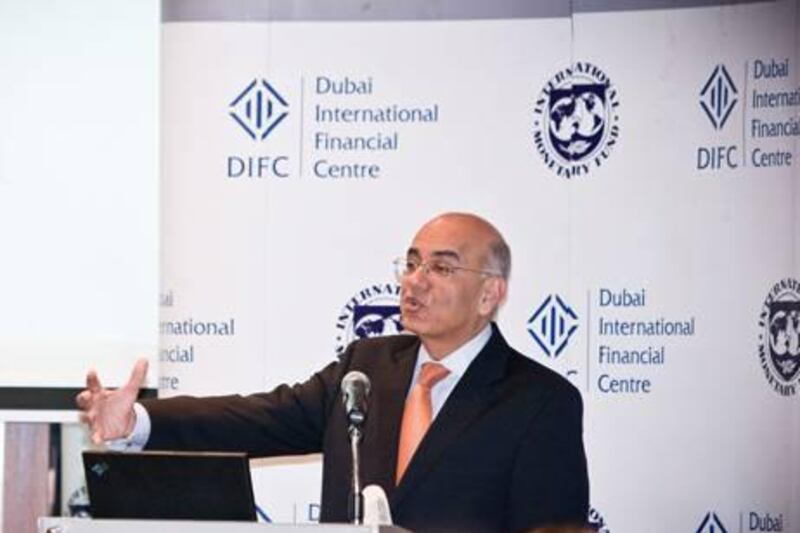The IMF is ready to help Egypt plug a funding gap of up to US$12 billion (Dh44.07bn) as the country seeks to rebuild its economy, says Dr Masood Ahmed, the fund's Middle East and Central Asia regional director.
Possible financial aid for Egypt comes as the IMF says it expects other regional oil importers hit by unrest and soaring commodity prices to require external assistance, and it is making as much as $35bn available to them.
"We stand ready to help Egypt whenever they come to us," Dr Ahmed said in Dubai yesterday. "The basic objective would be to advance on their social agenda and maintain macro-stability over the next 12 to 18 months."
So far, Egypt appears the closest to tapping into the IMF funds as it says it requires between $10bn and $12bn to rebalance the economy after unrest that swept Hosni Mubarak from the presidency in February.
It has held talks with the IMF, the World Bank and other countries including the GCC about possible aid.
Samir Radwan, Egypt's finance minister, said on Tuesday the country was seeking a loan of about $4bn from the IMF.
The interim government is facing pressure to create jobs and raise wages and subsidies. But government spending power is limited after a drop in foreign investment and tourism revenues. Egypt's fiscal deficit is expected to swell from about 8 per cent to double-digits this year, said Standard & Poor's ratings agency.
Dr Ahmed said Egypt had yet to ask the IMF formally for funding.
"For us it's a two-part package as there's the financing but there's also the policies we are supporting," he said.
"We want that package to be home-grown and something the Egyptian authorities [can] develop with external stakeholders … to ensure its success."
Other cash-strapped oil importers beset by recent troubles are struggling to help their citizens cope with rising commodity prices.
Higher spending on subsidies and other fiscal incentives were offsetting the impact of recent unrest on economic growth in oil-importing nations, said Dr Ahmed.
More Business News: Editor's pick of the headlines of the day
Last Updated: Apr 27, 2010
HSBC to cut hundreds of Middle East jobs HSBC cuts hundreds of jobs across the Middle East as it seeks cost efficiencies and greater profits. Read article
Sony investigates regional hacking Globally about 77m gamers have been victim to a hack of Sony's PlayStation Network, Here in the Middle East that could effect more than half a million gamers. Read article
Empire Aviation flies into India Dubai-based Empire Aviation is opening an office in Mumbai to cater to Indian demand for luxury air services. Read article
Capital pays off for Al Habtoor Abu Dhabi is now the top market for Al Habtoor Leighton Group, the Dubai contractor. Read article
Lack of sleep may have caused financial crisis The Life reports on how not catching forty winks could cost you dearly, according to research from Duke University which points to a link between sleep deprivation and excessive risk taking. Read article
But the higher expenditure carried risks, he warned.
"In many countries the fiscal packages will strain budgets to the point that they will need external help to see them through the financing of costs this year without imposing a big strain on government budgets or borrowing so much from the domestic market that they crowd out the private sector," said Dr Ahmed.
No other governments had yet held talks with the IMF about financial aid, he said. In addition to the IMF, other possible sources of external funding included GCC states and long-term development funds from the World Bank, he said. The $35bn was calculated based on the size of oil importers' quotas with the IMF, he said.
"The $35bn is part of a process that meets their initial finance needs, their transitions and modernising their approaches," he said.
Regional governments have for years been urged by the IMF to do away with subsidies, which account for about 8 per cent of overall GDP in the Middle East and North Africa. Instead, it argues, more targeted social safety nets are required to help those worst off. But expecting the withdrawal of subsidies in the short-term was unrealistic, said Dr Ahmed.
"Over the coming year, increased social spending is necessary for social cohesion," he said.





